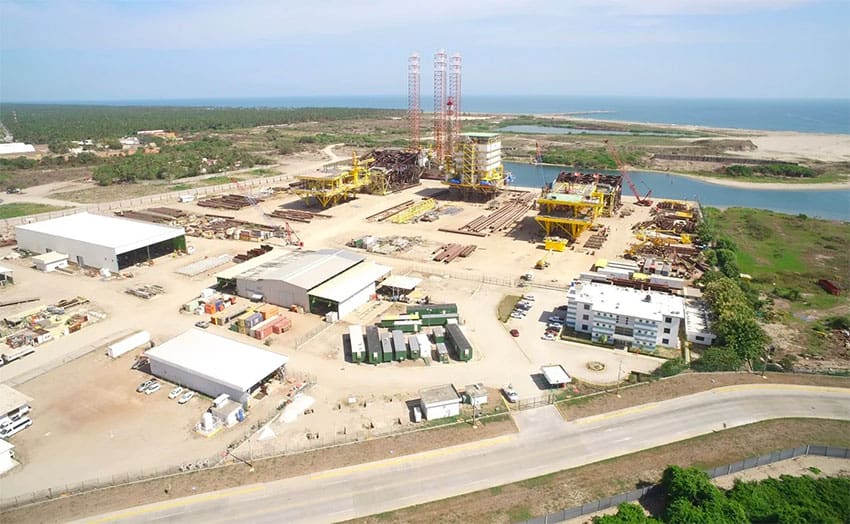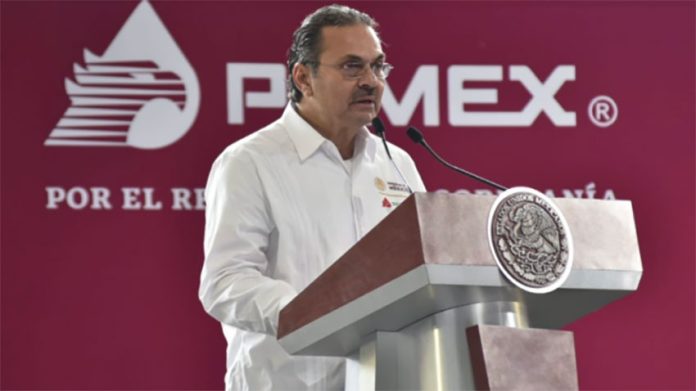The state oil company Pemex intends to slash crude oil exports in 2022 and end them in 2023 as it increases its refining capacity and the federal government pursues a policy of self-sufficiency for fuel.
Pemex exported just over 1 million barrels per day (bpd) in November but CEO Octavio Romero said Tuesday that it will only sell 435,000 bpd abroad next year.
He told President López Obrador’s regular press conference that crude exports will be phased out in 2023.
As exports decline, Mexico’s refining capacity will increase, Romero said. Mexico’s six existing refineries will ramp up production next year and together with Deer Park – the refinery near Houston of which Pemex will soon become the sole owner – will refine 1.5 million barrels of crude per day, he said.
That’s more than double the current output, which was 714,000 bpd in November.

Production is predicted to increase to 2 million bpd in 2023 due to the commencement of operations of the new Dos Bocas refinery on the Tabasco coast and the use of the Cangrejera petrochemical plant in Coatzacoalcos, Veracruz, to refine crude.
“In that way practically 100% of Mexican crude will be refined in our country to guarantee the supply of fuel,” Romero said.
Deer Park, currently a joint venture with Shell Oil Company, is considered part of Mexico’s national refining system (SNR) despite being located in the United States.
López Obrador has pledged that Mexico will become self-sufficient for fuel in 2023 as a result of his government’s investments to increase refining capacity. Energy Minister Rocío Nahle predicted Tuesday that the SNR will operate at 86% capacity by 2024, up from below 50% currently.
Due to limited refining capacity, Mexico currently depends on imports to meet demand, with most gasoline and diesel coming from the United States.
If Pemex keeps its word and halts crude exports in 2023 – an eventuality seen as unlikely by some – it will mark the exit from international oil markets of one of its most prominent players of the past decades, the news agency Bloomberg reported.
Mexico’s exports peaked at almost 1.9 million bpd in 2004 and the country has participated in meetings of the Organization of Petroleum Exporting Countries, or OPEC, as an observer. Among the countries to which it exports crude are Japan, India and the United States.
“Asian refineries, which buy more than one-fourth of Mexican crude shipments, are expected to bear the brunt of any export curbs. South Korean and Indian customers would be hit hardest but American and European refiners also would be impacted …,” Bloomberg said.
However, there is skepticism that Pemex will be capable of refining all of its own crude given its poor operating and safety record. The plan to halt crude exports has also been criticized as they provide significant revenue for Mexico and Pemex bondholders.
Rosanety Barrios, an Energy Ministry official during the 2012-18 government led by former president Enrique Peña Nieto, told Bloomberg that the pledge to end exports “seems impossible to me because the refineries are not capable of operating at 80%.”
John Padilla, managing director at energy consultancy IPD Latin America, expressed a similar view – even though the government has invested heavily to upgrade Pemex’s six existing refineries.
“They don’t have the refining capacity in place, they’ve not been able to increase their refining throughput, and the number of accidents has increased tremendously,” he told Bloomberg.
“You aren’t turning off exports unless you significantly reduce production of crude oil, and that would have major consequences for Pemex bondholders. Mexico would need to absorb massive amounts of Pemex debt,” Padilla said.
With reports from Bloomberg
